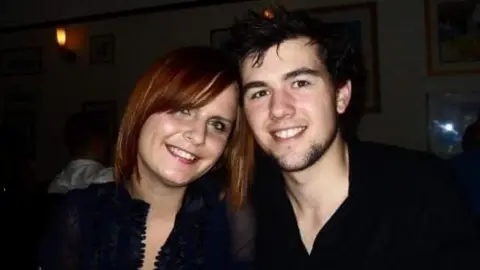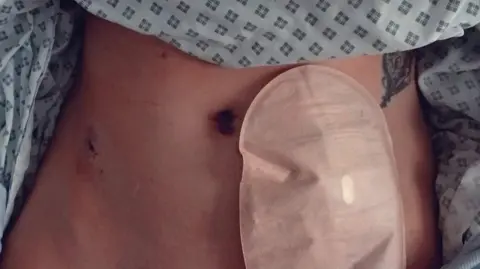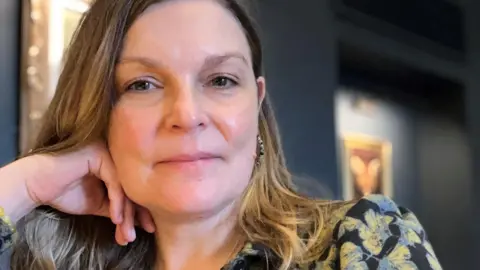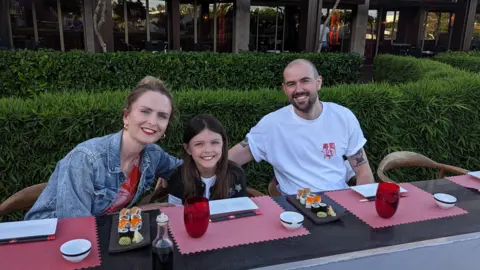I spent my 20s going through the menopause
 Emma Williams-Tully
Emma Williams-TullyA woman who was put into a chemical menopause at 20 years old due to undiagnosed endometriosis said she would not wish her experience on anyone.
Emma Williams-Tully, 39, from Wrexham started getting extremely heavy periods aged 10.
Despite going "back and forth" to various health professionals, endometriosis was not mentioned for another decade.
The Welsh government admitted improvements were needed to both endometriosis and menopause care in Wales.
For Emma, the endometriosis diagnostic process took a further 11 years, during which she was treated with a chemical injection called Prostap to manage symptoms.
"As far as the pain and bleeding went, it was amazing. But the menopausal symptoms, physically and emotionally, was hell on earth," she said.
She suffered with depression, hair loss, fatigue, brain fog and hot flushes.
"I didn't feel like a 20-year-old anymore, I felt like an old woman."
Endometriosis is a condition where tissue similar to the lining of the womb grows in other places, such as the ovaries and fallopian tubes.
Prostap suppresses a woman's ovarian function, halting the production of oestrogen - which feeds endometriosis - as well as progesterone and testosterone.
It puts them into a temporary menopause, but is not a cure for endometriosis. It is often used to test whether that is what is wrong, before embarking on invasive surgery.
But oestrogen can be needed for other things, including a healthy heart, brain and bones.
Treatment such as hormone replacement therapy (HRT) can be offered to women going through menopause, whether naturally or chemically, to add oestrogen back into their system.
But with endometriosis feeding off oestregen, it can be difficult to navigate.
Emma said she was only offered a "generic HRT" to combat the Prostap side effects, but was not told it could exacerbate her condition so decided to stop taking it.
She said the common association of menopause with older women left her feeling isolated and unable to share what she was going through, even with close friends.
"I felt very alone and very vulnerable.
"There's so many ways people go through menopause... it can be OK for some people but it can be pretty brutal for others, so it's breaking down that taboo."
When it began for her, she had just met her now-husband Dan, and wanted to be enjoying life like her peers.
 Emma Williams-Tully
Emma Williams-TullyEmma said she was never told what Prostap would do or asked if temporary menopause was something she was willing to go through.
The injections eased her symptoms, so it was suspected she did have endometriosis. But keyhole surgery found no sign of it, sparking a "vicious cycle" of surgery and Prostap.
She only came off it to try for a baby, which "wasn't easy" due to "indescribable" pain.
"You're trying to make this joyous time and it was awful. I luckily did fall pregnant naturally, but as soon as I gave birth I could feel the symptoms back."
At 31, so much damage was being done to Emma's organs she had to have a hysterectomy - the removal of the uterus.
But a sliver of fallopian tube was accidentally left, prompting an ovary regrowth only found in an unrelated ultrasound scan.
Her oestrogen levels being "through the roof" after the surgery was labelled an "enigma" and not taken seriously, she said.
"There are so many misconceptions... you come across as if you're constantly having to Google stuff and it's like, if I don't educate myself, what state am I going to be in?"
Emma now has an ileostomy, as well as colitis and bladder problems, and is awaiting colon and rectum removal.
"I wouldn't wish it on anyone," she said.
Katharine Gale, 50, is a women's health nurse in Lampeter, Ceredigion. She also has endometriosis and was on a medication called Zoladex, similar to Prostap, in her thirties.
When the peri-menopause began in her early 40s, she realised many women were not equipped to cope with it.
"I was on my knees, I was really overwhelmed and burned out," she said.
She said one in 100 women were under the age of 40 when they start going through the menopause.
"For women going through that at a much younger age, when their friends are starting to think about having a family or they're at university, it can be really challenging."
She said "we need to talk about the menopause more", adding there was a "lack of awareness" of help available.
"I think we're really failing women around their health."
 Katharine Gale
Katharine Gale'A postcode lottery'
Dr Michelle Olver, a sexual and reproductive health consultant, leads a specialist menopause clinic within Aneurin Bevan University Health Board, as well as a private clinic covering south Wales.
She said balancing the symptoms of endometriosis with the side effects of "being switched off" and add-back hormones was tricky, emphasising health services were moving away from a "one size fits all" approach, but admitting access to support was a "postcode lottery".
Dr Olver also teaches medical students at Cardiff University about the menopause, but such classes were not on offer when she trained.
 Emma Williams-Tully
Emma Williams-TullyEmma worries about the future, particularly for her nine-year-old daughter Belle.
"It petrifies me," she said.
"I don't think my daughter quite understands what mummy's tummy troubles are, because I don't want to put the fear into her."
She added: "There are young people messaging me every single day saying they're having awful problems and no one is believing them."
The Welsh government said health secretary Eluned Morgan had "made clear her commitment to improve women's health services", with a 10-year women's health plan for Wales due to be published by the end of this year.
"We recognise that there are improvements to be made in menopause and endometriosis care, treatment and support and greater consistency in those services is needed across Wales," it said.
